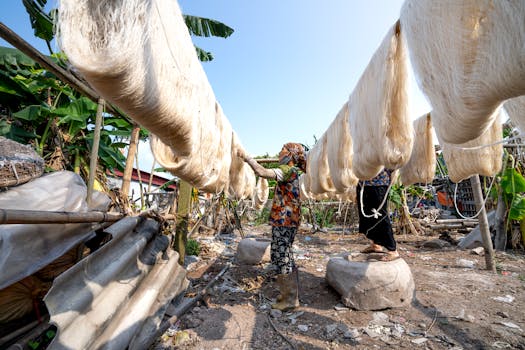Empowering Communities: The Role of Women in Africa’s Fiber Production

Empowering Communities: The Role of Women in Africa’s Fiber Production
Empowering Communities: The Role of Women in Africa’s Fiber Production is a vital aspect of the continent’s economic growth and community development. Women in Africa have long been involved in the production of various types of fibers, including cotton, wool, and flax, which are used to create textiles, clothing, and other essential products.
The fiber production industry in Africa is a significant contributor to the continent’s economy, providing employment and income opportunities for millions of people, particularly women. According to the International Labor Organization (ILO), the textile and clothing industry in Africa employs over 10 million people, with women making up a significant proportion of the workforce.
Women’s Participation in Africa’s Fiber Industry
Women’s participation in Africa’s fiber industry is crucial for several reasons. Firstly, women are often responsible for the production and processing of fibers, which requires significant skill and labor. Women’s involvement in the industry also helps to promote gender equality and empower women economically.
In addition, women’s participation in the fiber industry helps to preserve traditional skills and knowledge, which are essential for the production of high-quality fibers. Women in Africa have developed unique techniques and methods for producing and processing fibers, which are passed down from generation to generation.
Challenges Faced by Women in Africa’s Fiber Industry
Despite the significant contributions of women to Africa’s fiber industry, they face several challenges, including limited access to credit, lack of training and skills development, and poor working conditions. Women in the industry also face significant social and cultural barriers, including gender-based violence and discrimination.
To address these challenges, governments, NGOs, and private sector organizations are working to provide support and resources to women in the fiber industry. This includes training and skills development programs, access to credit and finance, and initiatives to promote gender equality and women’s empowerment.
Initiatives to Empower Women in Africa’s Fiber Industry
Several initiatives have been launched to empower women in Africa’s fiber industry. For example, the African Development Bank has launched a program to support women in the textile and clothing industry, which includes training and skills development, access to credit, and business development services.
In addition, NGOs such as the International Rescue Committee (IRC) are working to promote women’s economic empowerment in Africa, including in the fiber industry. The IRC provides training and skills development programs, as well as access to credit and finance, to help women start and grow their own businesses.
The private sector is also playing a crucial role in empowering women in Africa’s fiber industry. Companies such as H&M and Gap are working to promote sustainable and equitable practices in their supply chains, including supporting women’s economic empowerment and promoting gender equality.
Conclusion
In conclusion, the role of women in Africa’s fiber production is vital for the continent’s economic growth and community development. Women’s participation in the industry helps to promote gender equality, preserve traditional skills and knowledge, and provide employment and income opportunities.
To empower women in Africa’s fiber industry, it is essential to address the challenges they face, including limited access to credit, lack of training and skills development, and poor working conditions. Governments, NGOs, and private sector organizations must work together to provide support and resources to women in the industry, including training and skills development programs, access to credit and finance, and initiatives to promote gender equality and women’s empowerment.




